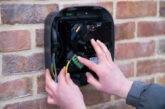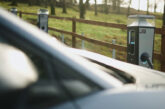
Eugene Lucarelli, Marketing Manager at GoodWe UK, discusses additional revenue streams electricians could be generating by segueing into solar, as well as the core training needed to take on PV installations.
A new year brings new resolutions, and for electricians not yet working with solar, transitioning into the industry could be the one resolution to make and keep this year – especially with the current clamour for solar system installations to safeguard against soaring energy bills.
In spite of this interest though, there remains a critical scarcity of competent workers who can meet demand. In August 2022, it was reported that just over 3,000 solar installations are being carried out every week, according to trade association Solar Energy UK (up from 1,000 a week in July 2020). That said, many solar firms are struggling with the boom in demand.
For electricians, taking a slice of the solar market is a lucrative opportunity that could create a new revenue stream and help the nation become self-sufficient at the same time.
The practice of PV
To become a proficient PV professional, installers will need a decent mix of theoretical background knowledge on available technology, as well as a host of practical skills.
Looking at equipment first, string inverters are the typical go-to choice. These range from commercial versions, such as GoodWe’s HT Series that comes in sizes such as 50kW, 60kW and 80kW, to residential inverters like GoodWe’s XS Series, which has a footprint comparable to an A4 piece of paper.
As a ‘halfway house’, hybrid inverters are also available. These inverters let users add a battery system to store any extra energy. Knowing the difference between batteries and functionality is key too as there are smart models that can be programmed to only charge at off-peak rates and offer backup for critical loads.
On the more practical side, electricians need to be aware of the Work at Height Regulations as panels tend to go on rooftops. Scaffolding typically needs to be placed around the property while the project is being undertaken, and work must be properly planned, risk assessed, and scheduled.
Good maths, design and specification skills are also required. This will make it easier to ascertain the anticipated energy consumption of the building’s tenants and choose which solutions best suit the use-case.
Specialist solar skills
Following on from this, electricians will then need to understand how to commission, monitor, troubleshoot, and maintain solar systems. Every system has its quirks, but it is best practice to deal with a single manufacturer to ensure that all of the equipment is compatible, which will speed up, simplify, and reduce the cost of installations.
The best way to learn solar is to undergo specialist training. GoodWe has started a new professional training initiative, GoodWe PLUS+, which offers practical guidance and skills and is composed of three straightforward online sessions led by a technical specialist. After passing, the qualification opens a plethora of extra benefits, including accreditation as a GoodWe PLUS+ approved installer.
To get more details about GoodWe’s range of products and training dates, click here









